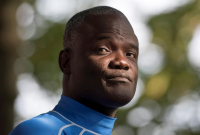Support strong Canadian climate journalism for 2025
Ottawa-based physician Emilio Bazile says food is running low for him and his 10-member medical team who have been trapped in southwest Haiti after protesters blocked major highways across the Caribbean country in an effort to pressure President Jovenel Moise to resign.
Bazile and three members of his group from the Maritimes are among more than 100 Canadians stuck in Haiti following violent protests that have claimed several lives over the past week.
Bazile's team arrived in southern Haiti on Jan. 30 to provide medical care to locals. They planned to stay for 14 days, but by Feb. 7, he said, protesters had blocked major roads around the country.
"The whole country is paralyzed," he said Thursday in an interview from Saint-Louis-du-Sud, about a six-hour drive from the capital, Port-au-Prince. "You cannot go through because there are barricades throughout the national roads. We have been lacking in food. Because nothing is coming from Port-au-Prince. Nothing. We have been eating spaghetti."
The Canadian embassy in Haiti has been closed since Wednesday. But Bazile said he found out Thursday that the barricade on a route to the capital had been removed. He and his team hope they will be able to make it to the capital.
"It's very risky, but it looks like Port-au-Prince is slowing down in terms of problems," he said. "We want to go to the airport and stay there and sleep there."
Protesters are angry about skyrocketing inflation and the government's failure to prosecute embezzlement from a multi-billion Venezuelan program that sent discounted oil to Haiti.
A team of 26 aid workers with a missionary group from Quebec are also among the scores of trapped Canadians.
Michel Bougie, vice-president of an evangelical Christian foundation that been present in Haiti for 20 years, said his team had been scheduled to return home on Wednesday but "they can't move." His foundation's medical clinic is located in a walled compound in the village of Tiverny, about 200 kilometres west of Port-au-Prince.
"All the roads in the country are blocked," Bougie said in an interview from Montreal. "It's really a well-concerted effort to literally paralyze the country with the goal of destabilizing the government." Bougie said his team of doctors, nurses and other personnel are safe despite the violence.
"The village itself isn't in danger," he said. He added that his group has experienced a coup d'etat, an earthquake and a hurricane in the past. "Things can happen in this country," Bougie said. "But they are people we love enormously."
Montreal Mayor Valerie Plante said Thursday that the city is recalling two employees who had been working on projects in Haiti. "It's not an easy decision to make because obviously we want to be able to support the Haitian people, but at the same time we have a duty to protect our employees," she said.
The mayor said Montreal police officers who are in the country will remain there.
More than 100 other Quebecers are stuck in a hotel, unable to make it to the Port-au-Prince airport because of the protests. The only highway linking the all-inclusive Royal Decameron Indigo Beach resort to the airport is considered extremely dangerous, and people are staying off it. The hotel on the country's Cote des Arcadins is about 75 kilometres north of the capital.
Air Transat, which sold package tours to the resort, says its flights between Montreal and Haiti are continuing, but it has been unable to provide safe ground transport from the resort to the airport. Christophe Hennebelle, vice-president corporate affairs for the airline, said he is hopeful it will be possible to get the stranded tourists to the airport "in the coming days."
Marie-Christine Remy, said her mother, Terry Watson, and her mother's partner, Sylvain Limoges, were supposed to fly home with Air Transat last Sunday but could not make it to the airport. They were switched to a flight Wednesday but again could not get out.
"It's really troubling," Remy said from Sherbrooke, Que. "I called the Canadian government and they told me that it was best to stay at the hotel, which is safer. It is the highways that are particularly dangerous."
Global Affairs Canada said in a statement Thursday it is providing consular advice to tour operators "as they work to ensure that their clients are able to leave Haiti safely. We encourage Canadians who are in Haiti as part of a package vacation to stay in touch with their tour operators as the situation develops."
The department said it has people on the ground in Haiti to provide assistance to Canadian citizens despite the embassy closure. "We will continue to evaluate the security situation over the coming days to determine what steps are necessary to ensure that our diplomats and their families are safe," it said.
Some tourists have told Quebec media that helicopter transport to the airport is available at a very high cost. Hennebelle said it would not be feasible to transport the people stranded at the resort by helicopter.




Comments